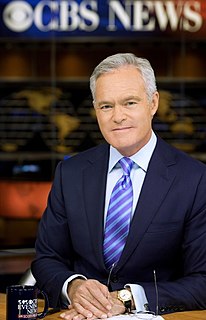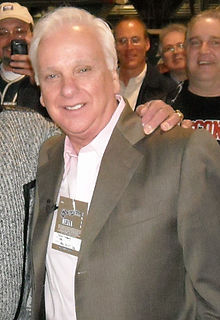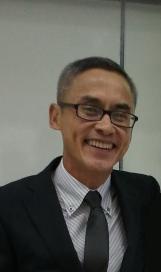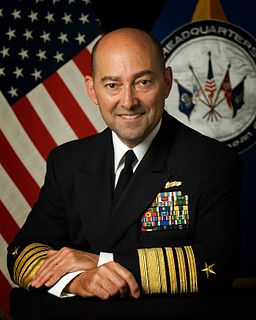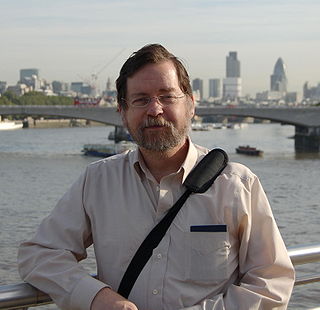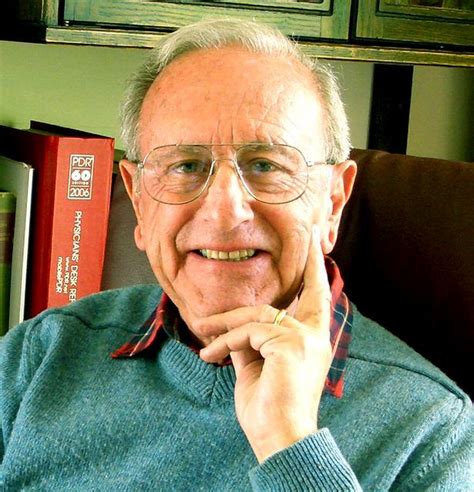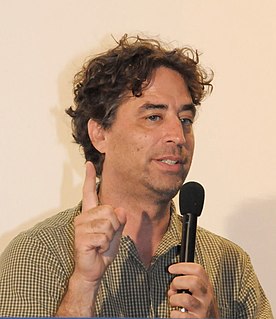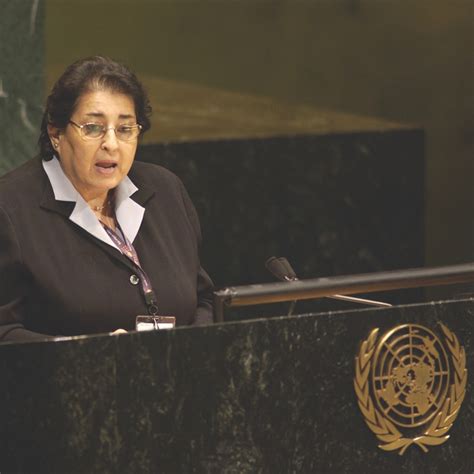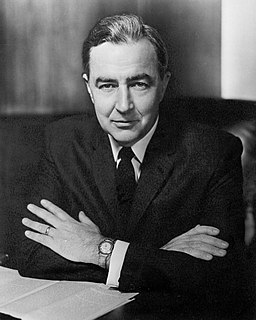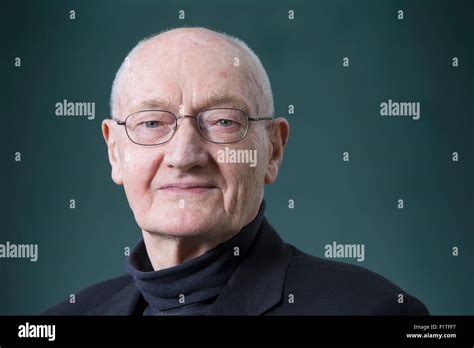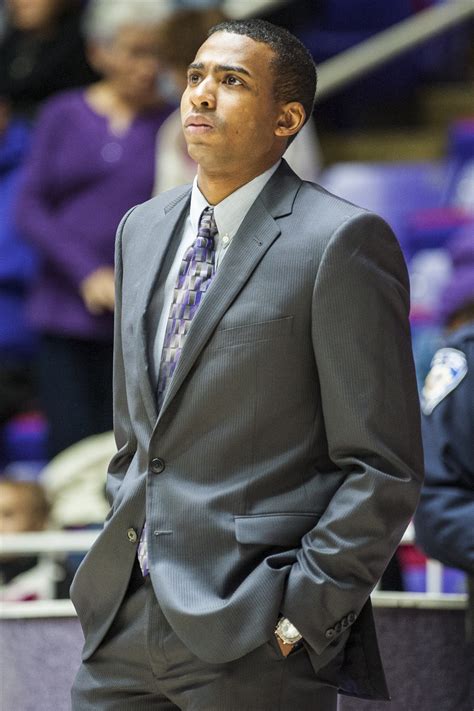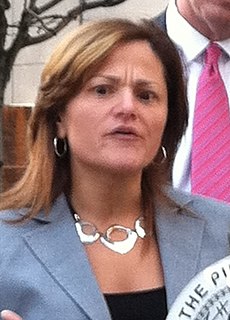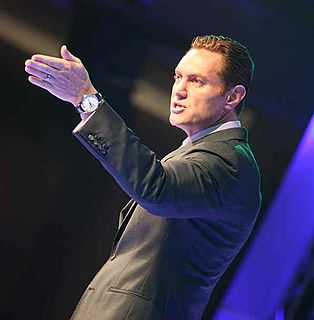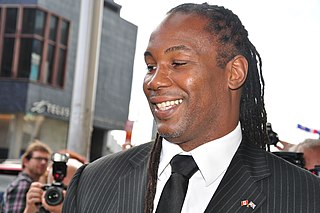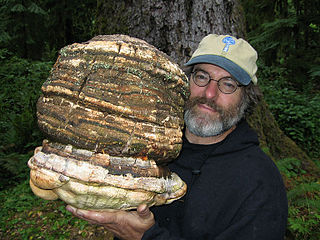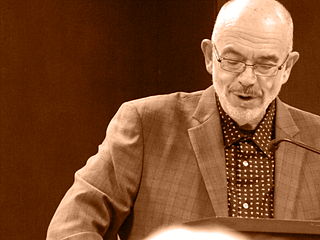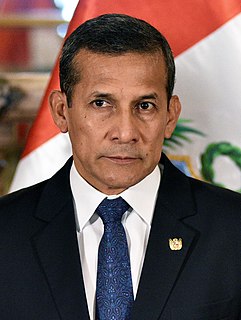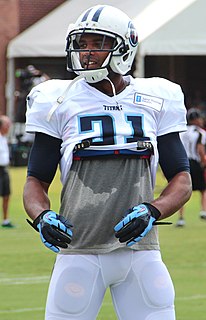Top 849 Networks Quotes & Sayings - Page 14
Explore popular Networks quotes.
Last updated on November 9, 2024.
Marketing by interrupting people isn’t cost-effective anymore. You can’t afford to seek out people and send them unwanted marketing messages, in large groups, and hope that some will send you money. Instead, the future belongs to marketers who establish a foundation and process where interested people can market to each other. Ignite consumer networks and then get out of the way and let them talk.
I am seized with an abiding fear regarding what these two instruments are doing to our society, our culture and our heritage. Our history will be what we make it. And if there are any historians about fifty or a hundred years from now, and there should be preserved the kinescopes for one week of all three networks, they will there find recorded in black and white, or color, evidence of decadence, escapism and insulation from the realities of the world in which we live.
We have entered a time when a writer's first idea is his best idea, when the first thing a reporter hears is the first thing that she reports. We live in a time now when we have seen major television networks take video off of YouTube and broadcast it to millions of Americans without verifying whether the video had been fabricated or not.
If I rule out violent anarchism, there remains pacifist, anti-nationalist, anti-capitalist, moral, and anti-democratic anarchism (i.e., that which is hostile to the falsified democracy of bourgeois states). There remains the anarchism which acts by means of persuasion, by the creation of small groups and networks, denouncing falsehood and oppression, aiming at a true overturning of authorities of all kinds as people at the bottom speak and organize themselves.
There are lots of reasons fewer people are watching network news, and one of them, I'm more convinced than ever, is that our viewers simply don't trust us. And for good reason. The old argument that the networks and other `media elites' have a liberal bias is so blatantly true that it's hardly worth discussing anymore. No, we don't sit around in dark corners and plan strategies on how we're going to slant the news. We don't have to. It comes naturally to most reporters.
I don't think BuddyPress will be something you use instead of your existing social networks... but if you wanted to start something new maybe with more control, friendlier terms of service, or just something customized and tweaked to fit exactly into your existing site, then BuddyPress is a great framework to use.
The patterns are simple, but followed together, they make for a whole that is wiser than the sum of its parts. Go for a walk; cultivate hunches; write everything down, but keep your folders messy; embrace serendipity; make generative mistakes; take on multiple hobbies; frequent coffeehouses and other liquid networks; follow the links; let others build on your ideas; borrow, recycle; reinvent. Build a tangled bank.
As a John Kerry supporter, I wanted to send him a check. But then it occurred to me that most of that money would end up in the hands of advertising agencies and television networks. And the money would be used to create deceptive commercials that flatter our point of view and shade the facts our way. And I wasn't comfortable with that. But on the other hand, that's how the game is played. You're always grappling.
When I started out as an activist, the issues were much clearer. There's advantage to the new media, but on the other hand, you miss the ability to frame an issue that you had when there were just three TV networks: CBS, NBC, and ABC. So the whole world could see the same police dogs. The same Bull Connor and his white tank. Now you've got narrow-casting. The media is all fragmented. It's so hard to get people to focus in a sustained way.
Poverty cannot be accepted as a pretext and justification for the exploitation of children. It does not explain the huge global demand with, in many instances, customers from rich countries circumventing their national laws to exploit children in other countries. Sex tourism has spread its illicit wings wide, and paedophiles search for their victims in all parts of the globe. The problem is compounded by the criminal networks which benefit from the trade in children, and by collusion and corruption in many national settings.
One of the problem with cyber is that it lends itself to preemptive action. Your assets in cyber-warfare are your opponents' vulnerabilities, therefore in order to quantify your assets you have to be able to ascertain how vulnerable your opponents are and that involves pre-emptive exploration of your opponents' networks. So in that sense it lends itself to some pretty nasty stuff.
In the 20th century, we built a lot of walls - we endlessly tried to build walls between us and people we perceived, correctly or incorrect, as our enemies. In the 21st century, because of the advent of networks, the free movement of goods and people across the globe, we need to build security by building bridges instead of building walls.
We live in a society of social networks, with Twitter pages and Facebook, and that’s fine, but we have contact with our work associates, our family, our friends, and it seems like half the time we are more preoccupied with our phone and other things going on instead of the actual relationships that we have right in front of us. Hopefully, people can learn from this and try to actually help if someone is battling something deeper on the inside than what they are revealing on a day-to-day basis.
Armstrong, sitting in the commander's seat, spacesuit on, helmet on, plugged into electrical and environmental umbilical's, is a man who is not only a machine himself in the links of these networks, but is also a man sitting in (what Collins is later to call) a 'mini-cathedral.' a man somewhat more than a pilot, somewhat more than a superpilot, is in fact a veritable high priest of the forces of society and scientific history concentrated in that mini cathedral, a general of the church of the forces of technology.
We godless lack that certainty, and we know the world is a complex place that requires compromise and is not ruled by a moral force - virtue is subject to negotiation, and is found in working together with others to find mutually satisfactory solutions. Good is not absolute, it is an emergent property that arises from successful networks of individuals. It is also something that is measured by evidence: we look at the good that people do, not the promises that they make and never keep, or the lies that dovetail nicely into dogma. Competence is a virtue. Intent is meaningless without action.
There are areas using what's called the "checkerboard strategy." They are different cities where you can move around the "checkerboard," doing things you can't do in every square, that you can do in some of them, building a mosaic of these kinds of practices. There are about 400 cable television networks, for example, that are publicly owned. That's a big fight for big private companies. In some areas, this is a political struggle, in some it's conventional common sense.
The first proponent of cortical memory networks on a major scale was neither a neuroscientist nor a computer scientist but .. a Viennes economist: Friedrich von Hayek (1899-1992). A man of exceptionally broad knowledge and profound insight into the operation of complex systems, Hayek applied such insight with remarkable success to economics (Nobel Prize, 1974), sociology, political science, jurisprudence, evolutionary theory, psychology, and brain science (Hayek, 1952).
I've been working in Hollywood for a long time now in many different aspects in front of the camera, behind the camera, and I've worked with top executives, presidents of networks. I've worked all around. I see energy and what's around these studios and a lot of these offices. You don't get the high positions in these companies if you don't take advantage of other people in some way. I've seen that around. I've seen that around the studios, whether it's producers or whoever. Egos are there. Greed.
During a historic gathering in Saudi Arabia, I called on the leaders of more than 50 Muslim nations to join together to drive out the menace which threatens all of humanity. We must stand united against shared enemies to strip them of their territory and their funding, and their networks, and any form of ideological support that they may have. While we will always welcome new citizens who share our values and love our people, our borders will always be closed to terrorism and extremism of any kind.
The hegemony of finance and the banks has produced the indebted. Control over information and communication networks has created the mediatized. The security regime and the generalized state of exception have constructed a figure prey to fear and yearning for protection—the securitized. And the corruption of democracy has forged a strange, depoliticized figure, the represented. These subjective figures constitute the social terrain on which—and against which—movements of resistance and rebellion must act.
We also know that the various faith-based institutions provide about 50 per cent of the health and education services in the poor communities; we also know that they have a large constituency including women and youth; they have outreach and networks and they are credible to their people. If we want to achieve the Millennium Development Foals by scaling up the responses of all the communities, do we ignore this large investment in people? Or do we engage in dialogue and in action?
I was going to say it's pretty bad these days, but I actually think it's pretty much the same as it's always been: There are a few really great shows on, and a bunch of garbage. That's the nature of the beast. It's always going to be that way as long as the networks try to second-guess what the American public will like. I wish that they'd just put on what they think is good rather than what they think people will sit through. I bet they'd have the same success rate, but at least the shows that survived would be better.
Katalyst is a merger of three industries. A piece of us is connected to ad agencies. Because we get the complex overlay of the social Web, we know how to engage an audience and how to make entertainment for the social Web. And we know how to gain and activate and retain an audience. So we create social networks for brands.
People are enduring more than a temporary financial crisis. We are witnessing a fundamental shift in the economy. Companies and industries will in great measure no longer grow by borrowing vast capital to make huge acquisitions. The way to grow to critical mass - the Google way - will be to become platforms and networks that enable others to build businesses, grow, and succeed.
As Indian citizens, we subsist on a regular diet of caste massacres and nuclear tests, mosque breakings and fashion shows, church burnings and expanding cell phone networks, bonded labor and the digital revolution, female infanticide and the NASDAQ crash, husbands who continue to burn their wives for dowry and our delectable stockpile of Miss Worlds. What's hard to reconcile oneself to, both personally and politically, is the schizophrenic nature of it.
There is danger in the concentration of control in the television and radio networks, especially in the large television and radio stations; danger in the concentration of ownership in the press...and danger in the increasing concentration of selection by book publishers and reviewers and by the producers of radio and television programs.
The Social Citizen is the best, most thorough, and most methodologically sophisticated treatment of the role of social networks in political behavior that I have ever read. Betsy Sinclair shows just how strongly we are influenced to express ourselves politically by our family, neighbors, and friends. We are on the verge of a sea change in political science, and this will be one of the most important books we refer to when we describe what happened to the discipline in the twenty-first century.
There are many strengths in modern society, but one of its weaknesses is the breakdown of many of the old structures and networks that supported people in times of crisis and need. Whenever we lose a strengthening element in society, we need to replace it with alternative systems as quickly as possible. Befriending schemes are a crucial part of this process, because they fill the gap that social erosion has left in the lives of so many vulnerable people.
And there's a period where everyone's buying those and it's really bad because no one is Larry David or Ricky Gervais. And then they don't work and networks stop wanting to buy them, but because they wanted to buy them before the producer wanted to make them, the producers are still hanging on to wanting to make them.
You [young people] all are just much more internationally-minded and traveled and knowledgeable in languages than any other previous generation. So many of you are already doing a lot of international relations, I think. I so believe in student networks, and people that either study abroad or come to the United States to study, and the relationships that you all develop. You learn a lot from each other, but you all will see each other again in jobs along the way. And I think that makes a big difference. I so believe in what students can do.
The regime of control tightens inexorably in our schools, many of which now have video cameras, police patrols, chain-link fences, random unannounced locker searches, metal detectors, drug-sniffing dogs, networks of informants, undercover police posing as students, and a comprehensive system of passes so that there is a record of each student's authorized whereabouts at all times. What a perfect preparation for life in a prison or a totalitarian society!
Our vision of interconnectedness resonates with new networks of world citizens in nongovernmental organizations linking from numberless centers of energy, expressing the emergence of a new organic whole, seeking unity within and across national lines... If governments and their leaders, bound by hierarchy and patriarchy, wedded to military might for legitimacy, fail to grasp the implications of an emerging world consciousness for cooperation, for peace and for sustainability, they may become irrelevant.
The brain is really hard to see. The whole thing is very large - the human brain is several pounds in weight - but the connections between brain cells, known as synapses, are really tiny. They're nanoscale in dimension. So if you want to see how the cells of the brain are connected in networks, you have to see those connections, those synapses.
Because of the control of the media by corporate wealth, the discovery of truth depends on an alternative media, such as small radio stations, networks, programs. Also, alternative newspapers, which exist all over the country. Also, cable TV programs, which are not dependent on commercial advertising. Also, the internet, which can reach millions of people by-passing the conventional media.
In my view, nobody is really effective in tackling those organized crime networks that are making connections from Africa to Asia to fund and facilitate the poaching of massive volumes of ivory, and then selling it on the Asian market. Very few people have tried globally to tackle that serious organized crime threat that is also linked to militia groups. That needs to change. You need to bring the full weight of government attention to dealing with that.
Is it not a rather fantastic historical irony that the torture techniques that the North Vietnamese used against McCain that forced him to offer a videotaped false confession are now the techniques the Bush administration is using to gain "intelligence" about terror networks. How is it possible to know that everything John McCain once said on videotape for the enemy was false, because it was coerced, and yet assert that everything we torture out of terror suspects using exactly the same techniques is true?
Essentially, there's a universe inside your brain. The number of connections possible inside your brain is limitless. And as people have learned to have more managerial and direct creative access to their brains, they have also developed matrices or networks of people that communicate electronically. There are direct brain/computer link-ups. You can just jack yourself in and pilot your brain around in cyberspace-electronic space.
Many more children observe attitudes, values and ways different from or in conflict with those of their families, social networks,and institutions. Yet today's young people are no more mature or capable of handling the increased conflicting and often stimulating information they receive than were young people of the past, who received the information and had more adult control of and advice about the information they did receive.
We don't have the Democrats doing a Fox News debate. They have decided they want to boycott Fox News, at least this election cycle. I don't see Hillary and Bernie Sanders doing a Fox News debate. And they should. We have great journalists on this network. I'm an opinion person. It wouldn't be me - that I think would do a great job. But if they're not going to put themselves in an environment like this, do you have to now reconsider, in other words, going forward, that maybe these liberal networks don't deserve the access to these candidates?
We have to change laws. We have to change our approach to policing and incarceration in general. But we can get the population to a point where we can then go to the community-based facility models, where people should be able to await their trial dates, or if you're in jail for a year or less, if you have some sort of time that you have to spend in jail, that you can do it closer to your networks. Your family can visit you. You can talk about other ways of having people complete their time.
Today, financial capital is no longer the key asset. It is human capital. Success is no longer about economic competence as the main leverage. It is about emotional intelligence. It is no longer about controls. It is about collaboration. It is no longer about hierarchies. It is about leading through networks. It is no longer about aligning people through structures and spreadsheets. It is about aligning them through meaning and purpose. It is no longer about developing followers. It is about developing leaders.
If old consumers were assumed to be passive, then new consumers are active. If old consumers were predictable and stayed where you told them, then new consumers are migratory, showing a declining loyalty to networks or media. If old consumers were isolated individuals, then new consumers are more socially connected. If the work of media consumers was once silent and invisible, then new consumers are now noisy and public.
Boxing always was corrupt and always will be corrupt. The three world champion's belts really are absurd. One single association would make this business more reputable. Just as powerful as the promoters, is the media. The cable networks control the cash flow. You can?t ignore the influence the media and the promoters have on the sport. They have a financial objective - high ratings, selling pay-per-views and selling out arenas. Because of the system, the public may not be seeing the best the sport has to offer, but what sells.
I see the mycelium as the Earth's natural Internet, a consciousness with which we might be able to communicate. Through cross-species interfacing, we may one day exchange information with these sentient cellular networks. Because these externalized neurological nets sense any impression upon them, from footsteps to falling tree branches, they could relay enormous amounts of data regarding the movements of all organisms through the landscape.
Now with the allocation and the understanding of the lack of understanding, we enter into a new era of science in which we feel nothing more than so much so as to say that those within themselves, comporary or non-comporary, will figuratively figure into the folding of our non-understanding and our partial understanding to the networks of which we all draw our source and conclusions from.
However, if we leave the industrial machinery and their energy-distribution networks and leave them also all the people who have routine jobs operating the industrial machinery and distributing its products, and we take away from all the industrial countries all their ideologies and all the politicians and political machine workers, people would keep right on eating. Possibly getting on a little better than before.
So we didn't get the denominations and the separate congregations really till about into Civil War time. What's happened then, of course, is now that we've had well over 100 years of this history to establish separate cultures, different ways of worshipping, and different ways of understanding theology so that when people try to come together makes it very difficult. And then, of course, social networks, you know, how do we find a place to worship?
It's my firm conclusion that human meaning comes from humans, not from a supernatural source. After we die, our hopes for an afterlife reside in the social networks that we influenced while we were alive. If we influence people in a positive way -- even if our social web is only as big as our nuclear family -- others will want to emulate us and pass on our ideas, manners, and lifestyle to future generations. This is more than enough motivation for me to do good things in my life and teach my children to do the same.
I have said, and I believe, that potentially we have in this country a free enterprise system of radio and television which is superior to any other. But to achieve its promise, it must be both free and enterprising. There is no suggestion here that networks or individual stations should operate as philanthropies. But I can find nothing in the Bill of Rights or in the Communications Act which says that they must increase their net profits each year, lest the Republic collapse.
Computer security can simply be protecting your equipment and files from disgruntled employees, spies, and anything that goes bump in the night, but there is much more. Computer security helps ensure that your computers, networks, and peripherals work as expected all the time, and that your data is safe in the event of hard disk crash or a power failure resulting from an electrical storm. Computer security also makes sure no damage is done to your data and that no one is able to read it unless you want them to.
I don't know. Maybe we're all chaos theorists. Lovers of pattern and predictability, we're scared shitless of explosive change. But we're fascinated by it, too. Drawn to it. Travelers tap their brakes to ogle the mutilation and mangled metal on the side of the interstate, and the traffic backs up for miles. Hijacked planes crash into skyscrapers, breached levees drown a city, and CNN and the networks rush to the scene so that we can all sit in front of our TVs and feast on the footage. Stare, stunned, at the pandemonium--the devils let loose from their cages.
We all know of the dangers and inequities of the traditional digital divide: People who have good access tocomputer networks have a distinct advantage - in terms of both life opportunities and quality of life, I wouldargue - over the vast majority of the world's population that does not yet have good access to computernetworks. The "other" digital divide points to an increasingly unstable situation that has developed inlibrarianship as digital libraries have evolved and matured.
They could never go back to being a uniracial congregation again. It brings excitement. It brings life. It allows them to be able to know people they would never know, to meet people that are outside the congregation they would have never connected with, you know, through the networks that they developed in the congregation.
It is tempting to call for better leadership, but we probably expect too much from the leaders of the nations. Those nations are too big, the connections not strong enough, the commitment to the future not long enough. It is better to look smaller, to our now-smaller organisations, to local communities and cities, to families and clusters of friends, to small networks of portfolio people with time to give to something bigger than themselves. We have to fashion our own directions in our own places.
What I think networks do so well are big, fun, accessible, invite everybody into the tent kinds of storytelling, akin to an early Spielberg movie or a Michael Crichton novel. That's not to say that there aren't scary parts 'cause there are, and that there aren't sexy parts and edgy parts, just like early Spielberg would have, but there's a lot of heart, a lot of emotion and complicated characters.
I think the coca grower needs an alternative to stop growing coca. We need to have a comprehensive policy, which means separating the coca-growing population from the drug-trafficking networks through more presence of the state in the fields of health, education, infrastructure. We need to fight against money-laundering and the exporting of large amounts of cocaine through our ports.
We need to take information, wherever it is stored, make our copies and share them with the world. We need to take stuff that's out of copyright and add it to the archive. We need to buy secret databases and put them on the Web. We need to download scientific journals and upload them to file sharing networks... With enough of us, around the world, we’ll not just send a strong message opposing the privatization of knowledge - we’ll make it a thing of the past. Will you join us?
Anybody who is a professional athlete who has a social media account on any of the networks, when they sign up for that account, they subject themselves to all of the criticisms and all of the praises that may or may not be out there. So you can't get on social media and complain about the people because that's what you know you're dealing with. You have to hear it. You don't have to respond. Me personally, I don't respond to the negativity. It's gonna be there. I read it. It keeps me grounded.
The Baathist state did two things extremely well. One was create information-gathering intelligence networks and a filing system. There's actually a lot of information on a lot of people and that is a major achievement of a police state. The second one is the promotion of literature and poetry, and the arts generally. So this is a state that's producing mass police archives - surveillance - and poetry. And in fact a lot of the archives are about what poets are writing or what they should be writing.


